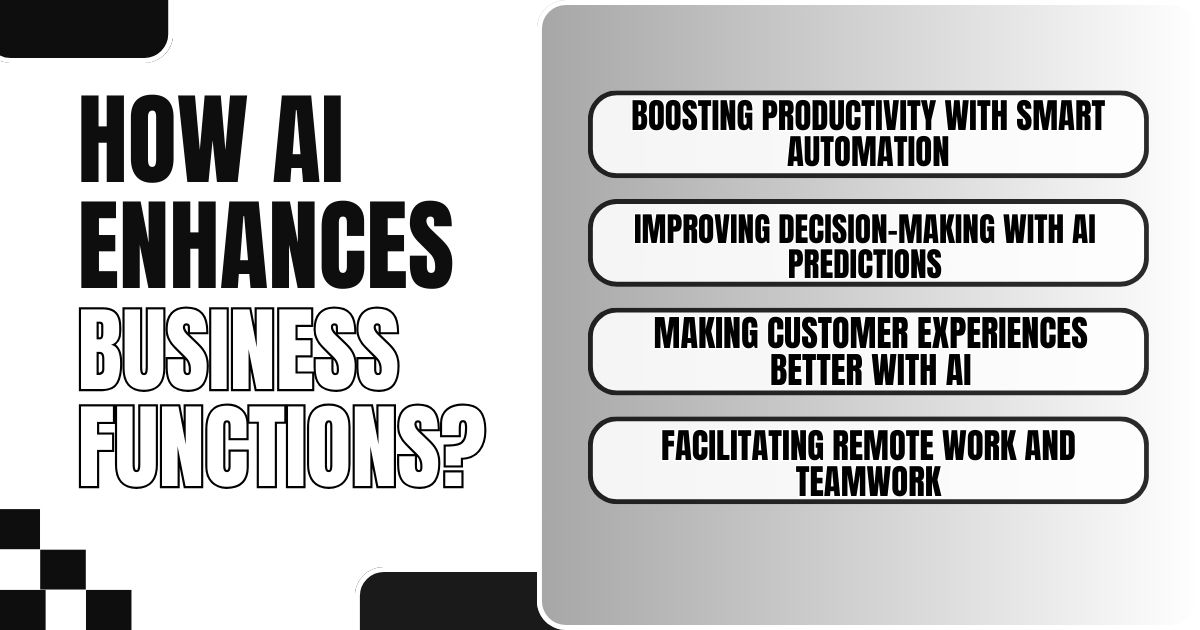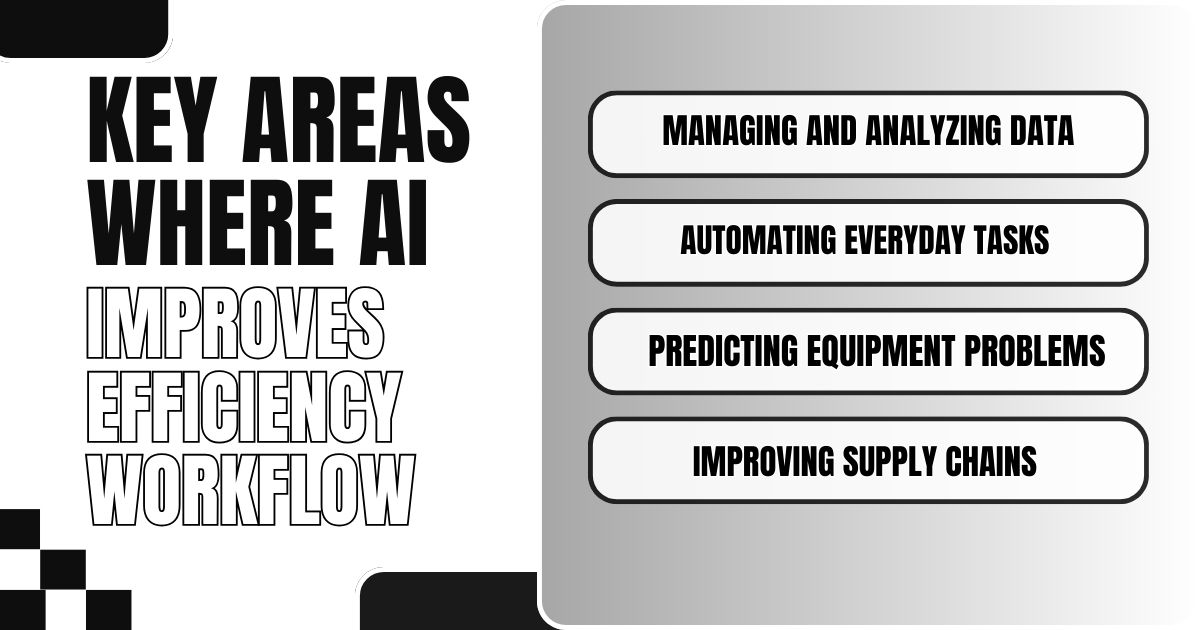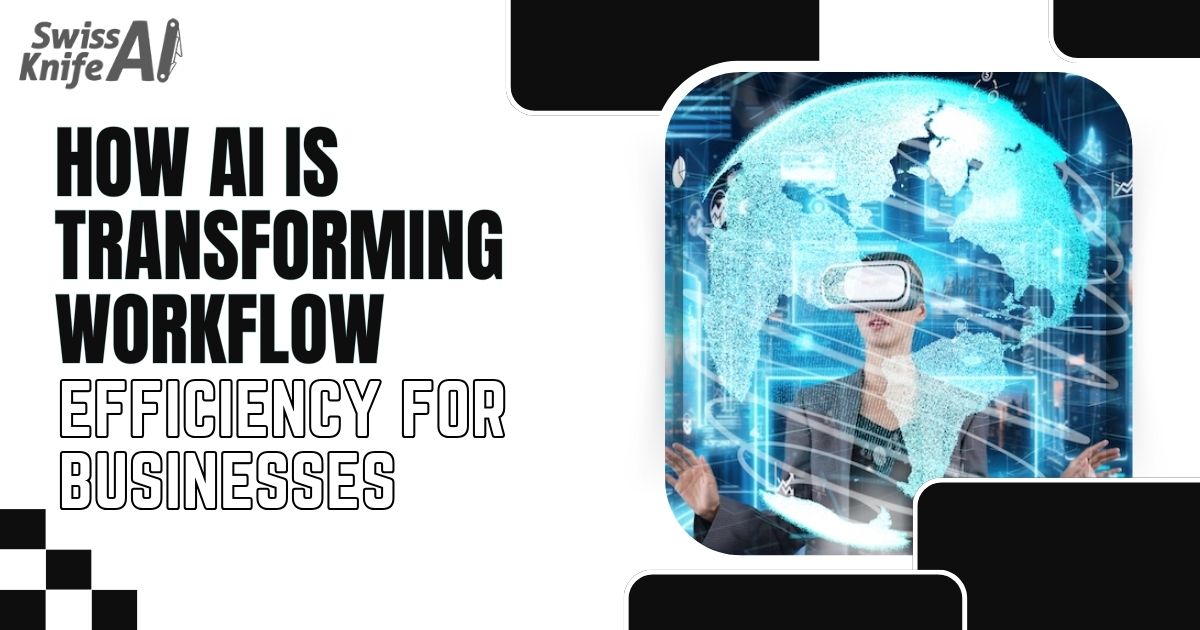You’re buried in paperwork, stuck in endless meetings, and despite working late every night, your business goals feel out of reach. Could it be that you’ve missed something? Today, everyone needs to be more efficient and productive than ever.
Managing tons of data or writing complicated code are just a couple of examples of tough tasks that take a lot of time and skill. But now, with Artificial Intelligence (AI), there’s a new way to make things easier. Unlocking AI can simplify complicated tasks and change how we work with technology.
What is Artificial Intelligence (AI) in Business?
-in-Business.jpg)
Artificial intelligence (AI) is when computers and machines are programmed to think and solve problems like humans do. Businesses use AI to help with many things, such as understanding data, improving customer service, creating content, and making their operations run smoothly. As AI gets better, companies find even more ways to use it, especially for workflow optimization.
AI works alongside people to make their jobs easier and help businesses optimize workflow and run more efficiently. It can do things like automate boring, repetitive tasks, analyze large amounts of data, and predict what might happen in the future based on information it has learned.
AI systems are used in many ways to automate business processes, which helps reduce mistakes and allows people to focus on more important work. This improves workflow integration and optimizes workflow performance.
The Rise of AI in Workflow Optimization
Artificial Intelligence, which used to be something only seen in science fiction, is now a big part of our everyday lives. We see it in virtual helpers like Siri and Alexa, and even in the way Netflix and Spotify suggest shows or music we might like. But AI does more than just help us at home—it’s also changing how businesses work by making their tasks faster and improving workflow efficiency.
How AI Enhances Business Functions?

AI is transforming the way businesses operate by making them more efficient and effective. Here are examples of how AI improves business functions:
Boosting Productivity with Smart Automation
Smart automation, powered by AI, helps workplaces work faster and smarter. AI quickly processes large amounts of data, allowing companies to focus on big goals instead of repetitive tasks. It also improves accuracy and customizes work, like personalizing customer messages or optimizing supply chains. This boosts workflow efficiency, productivity, and drives continuous improvement.
Improving Decision-Making with AI Predictions
AI can use past information to guess what might happen in the future. This helps companies spot new trends, understand what customers want, and see potential problems before they arise. With these predictions, businesses can make smarter decisions, avoid mistakes, and stay ahead of their competitors.
AI also helps companies create products that customers really want, boosting sales and loyalty. That’s why using AI predictions is now a key part of workflow integration in running a successful business.
Making Customer Experiences Better with AI
Today, making customers happy often means personalizing their experience. Thanks to AI, businesses can easily adjust their products and services to fit each customer's needs. AI tools study customer behavior and preferences, helping companies offer what customers want before they even ask.
This not only makes customers feel special but also keeps them coming back. With so many choices available, personal touches can make a big difference in customer loyalty.
Facilitating Remote Work and Teamwork
Remote work is growing, and having good tools to work together is super important. AI helps make this easier by setting up meetings automatically, translating languages instantly, and predicting how long tasks will take.
AI lets teams work well together, no matter where they are. It makes remote work more effective and often more appealing, helping everyone stay connected and adapt easily. AI has truly changed how we collaborate, making teamwork simpler and more efficient.
Key Areas Where AI Improves Efficiency Workflow

Here are the following key areas where AI optimizes performance and helps businesses save time:
Managing and Analyzing Data
AI (Artificial Intelligence) can look through huge amounts of data and find important information that helps businesses make smart decisions.
- Machine learning (a part of AI) can find patterns that people might not notice, leading to new ideas for the business.
- Natural Language Processing (NLP) helps AI understand things like customer reviews or social media posts, giving businesses helpful information about what customers want.
Example: Amazon’s AI-powered recommendation system suggests products to customers and is responsible for 35% of the company's total sales.
Automating Everyday Tasks
AI is now handling many of the repetitive tasks in businesses, from answering customer questions to managing paperwork.
- AI chatbots can respond to up to 80% of common customer questions, allowing human workers to focus on harder tasks.
- Robotic Process Automation (RPA) can make tasks like processing invoices much faster, reducing the time spent by up to 80%.
Example: JP Morgan’s COIN program uses AI to read loan agreements in seconds, saving 360,000 hours of work previously done by lawyers each year.
Predicting Equipment Problems
AI is helping companies keep their machines working longer and better by predicting when they might break down.
- Machine learning can predict equipment failures with up to 92% accuracy, which means fewer breakdowns and lower costs.
- Sensors connected to AI can help machines last 20-40% longer.
Example: Siemens uses AI to predict when wind turbines need maintenance, reducing their maintenance costs by 30%.
Improving Supply Chains
AI is making supply chains (the process of getting products to customers) faster and more efficient.
- AI can predict customer demand more accurately, reducing mistakes by 30-50%.
- Smart algorithms can find the best delivery routes, cutting fuel costs by up to 15%.
Example: Alibaba uses AI in its smart logistics system to improve packaging and routing, cutting delivery times by 30%.
Upgrade Your Business Workflow Efficiency with SwissKnifeAI
AI is not just about doing tasks for us; it's also about helping us be more creative and efficient. With AI as a productivity partner, people and companies can come up with new ideas and work better. AI is a powerful tool driving modern business success.
Using AI helps companies make their work more efficient, cut down on mistakes, and focus on big goals instead of boring tasks. AI can handle lots of data, guess future trends, and improve teamwork, making it a key tool for success and innovation.
SwissKnifeAI takes this a step further by simplifying tough tasks, improving workflows, and boosting productivity. It automates routine jobs, aids in making smarter decisions with data, and personalizes customer interactions, transforming how businesses operate. Stay ahead of your competitors—start using SwissKnifeAI today.
FAQs
How does AI improve business efficiency?
A major way AI boosts productivity is through automation. By handling repetitive and time-consuming tasks, AI frees up employees to focus on more important and creative aspects of their work.
What is the benefit of bringing AI into the decision-making workflow?
AI is changing industries by improving decision-making with its ability to quickly and accurately analyze large amounts of data. This makes it perfect for making smarter and more effective decisions in today’s world.
How does AI improve operational efficiency?
AI in supply chain management improves decision-making and operational efficiency. It helps businesses analyze large data sets in real time, predict market trends, optimize logistics, and adjust routing and scheduling based on current conditions.
How can we ensure that AI improves equity effectiveness and efficiency?
Understanding how AI systems make decisions and setting up accountability measures can help reduce risks and ensure fairness in their use.


Leave a comment